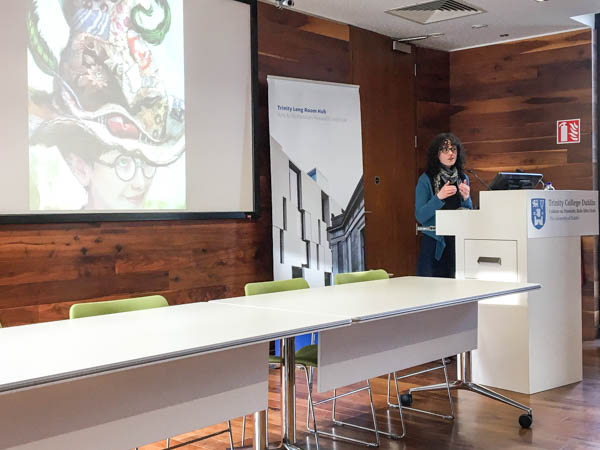On the day that Bertie Ahern became Taoiseach in 1997, “Mmbop” by Hansen was on the radio. Disney’s Hercules was about to be released in cinemas. At the same time, an unassuming children’s fantasy book was put on the shelves of bookshops for the first time. This book, Harry Potter and the Philosopher’s Stone, went on to be the starting point of the biggest literary phenomenon of the early 21st century.
This Thursday lunchtime, an eager and mixed crowd of undergraduates, postgraduates, academics and curious members of the public gathered in the Neill Lecture Theatre of Trinity’s Long Room Hub for the first in 2018’s free public lecture series on popular literature.
The lecture, given by Dr Jane Suzanne Carroll of Trinity’s School of English, was entitled “Wands, Words & Wizard Wheezes: 20 Years of Harry Potter”. It served as a celebration of Rowling’s first book, as Carroll described the series’ popularity as the literary equivalent of Beatlemania. The hysteria of Potterheads remains largely unmatched by other fans in the book industry, and Carroll concedes that while “it’d be great” to see a new series that could match it, she’s doubtful as “publishers would be quicker to jump on it now”.
Carroll is an Ussher Assistant Professor in Children’s Literature and Co-Director of Trinity’s MPhil in Children’s Literature. She authored a monograph, Landscape in Children’s Literature, in 2012, and has published extensively on children’s fantasy. Her expertise made her the perfect person to deliver this lecture, as she claims she is not one to jump on the bandwagon unless a book is good – and her enthusiasm towards Harry Potter reaffirms the series’ greatness.
Carroll tweeted during her preparation for the lecture that “the most difficult part of this talk will be whittling down the hundreds of images and ideas” and that instead she would likely “babble endlessly about how great Hagrid is”. She did more than just that, discussing wands, mirrors, morality.
She also touched on Rowling’s use of literary tropes, the significance of language in the books and its relationship to spells, naming and more. In doing so, Carroll looked back as far as the year 212 AD in tracing the history of magical practices, and examined the source texts Rowling nods to, including fairy tales, myths, the Bible, the Odyssey and the works of Shakespeare and Dickens. She also paid tribute to Ursula Le Guin, the acclaimed American fantasy author who passed away on Monday. Le Guin, like Rowling, acknowledged the power of words in her work – as Carroll quoted, “all wizards, including writers, are extremely careful about their spells. Every word must be the right word.”
Carroll highlighted the significance of Harry Potter by illustrating its impact on academia. It helped children’s literature as a research area to grow, to the point that two students in Trinity’s School of English are currently undertaking PhD research on Rowling’s work. It has now become a respectable and prominent field of study. Harry Potter also “transformed how we think about children’s books” – their sales have increased by 20 per cent since 1997, and they are now front and centre in bookshops around the world. The New York Times’s children’s best-sellers list was only developed because of Harry Potter, as it wouldn’t shift from the top spot of the adult list. Its crossover readership was also phenomenal.
Carroll also asserts that Harry Potter readers are good people – they absorbed the morals contained in the books from a young age, developing emotional intelligence and empathy in the process, and this influence has meant that said readers were least likely to vote for Donald Trump. “Harry Potter is so much like an ordinary person”, and the appeal of his story endures due to the “patchwork of the mundane and the extraordinary” that Rowling creates in her wizarding world. Readers can relate, and that’s why they never stop waiting for their letter to Hogwarts.







